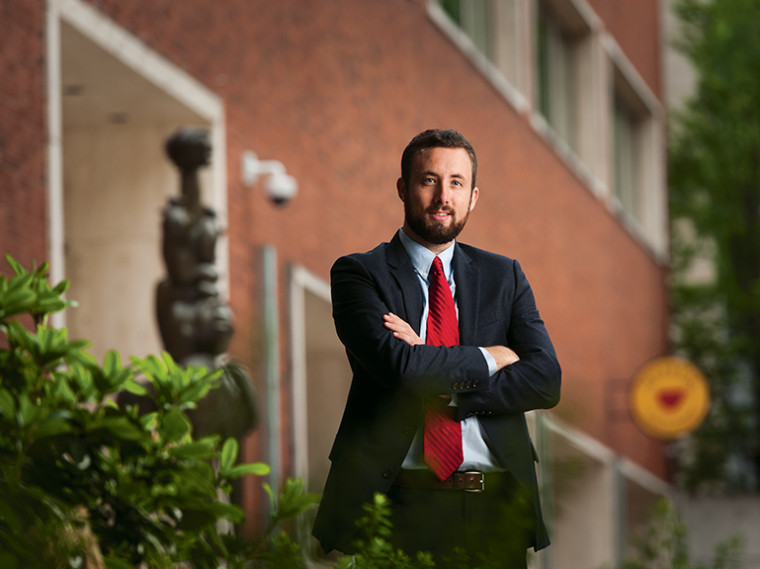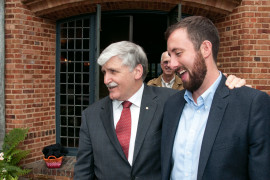Peace Seeker
Open gallery

By Dan Sadowsky | Photo by Steve Hambuchen
How does an emotional spark lead to transformative action? Ask Michael Graham BA ’05, a champion for Rwandan students, a campaigner against genocide, and an advocate for human rights.
One day last March, Michael Graham sat down at his laptop, surfed over to YouTube, and logged one of the 100 million views of “Kony 2012.” The 30-minute video publicized a marauding African warlord who’d been abducting children and terrorizing villages for decades.
Graham’s first reaction was dismay. As a graduate student in international affairs, he thought the filmmakers simplified and sensationalized a grave issue, and misled young people by suggesting that buying bracelets and hanging posters would ensure the capture of the world’s most wanted war criminal.
But he also realized his own career in human rights and conflict prevention—which has already had an impact at Lewis & Clark and beyond—resulted from a similar trigger. He saw his younger self in those who were quickly making “Kony 2012” an Internet sensation: idealistic young people who wanted to make a difference in the world, but weren’t exactly sure how.
His exploration of how to make a difference began on Palatine Hill. “To me, the unique value of Lewis & Clark is having faculty who are devoted to international issues and an environment that’s intellectually critical and deeply supportive,” says Graham. “In my case, it helped not only to create the spark I needed but to cultivate it, too.”
❧
Graham’s own journey from undirected teen to human-rights scholar began in Enterprise, Oregon, a town of 2,000 at the base of the Wallowa Mountains. His upbringing wasn’t all lonely roads and open spaces. His family lived in the Seattle suburbs until he was 10, and his parents were active in social and political causes. His dad, a physician who’d done medical missions in Nicaragua and Guatemala, twice took the family to Latin America on trips that included bus rides to remote villages.
Graham knew he wanted to study international issues when he arrived at Lewis & Clark in 2001. But that vague desire lacked focus until 2003.
One afternoon that fall, Graham sat spellbound in a class taught by Richard Peck, now professor emeritus of international affairs. A projector showed a PBS Frontline documentary on the 1994 Rwandan genocide, “Triumph of Evil,” which indicted the U.N. and Western powers for their failure to intervene.
This was before Hollywood’s Hotel Rwanda and the barrage of 10-year anniversary remembrances that placed the genocide on the radar of Graham’s generation. He was shocked to learn the scale and the details of a tragedy he’d known of only hazily: 800,000 Tutsis and moderate Hutus were hunted down and murdered in a matter of weeks while the world stood by and watched.
He had found his focus. “I figured I found the worst of the worst,” Graham says, “so it was probably a good place to start.”
❧
The following summer, Graham was in Rwanda’s orderly capital of Kigali, searching for people to share their genocide-era stories on video. He’d conceived of a project to film stories of survivors there, took out a loan to purchase video equipment, and won a research grant from Lewis & Clark’s Student Academic Affairs Board to offset other costs. The film didn’t turn out as he’d hoped, but a friendship he struck made a lasting difference for the college.

When he returned to campus, he enlisted the help of other students and Academic English Studies Director Joann Geddes to persuade then President Tom Hochstettler to waive tuition and lodging for one Rwandan student. Bon Appetit offered to donate a year’s worth of meals.
Still, he needed more financial backing to cover airfare and other expenses. He’d been trying since early 2004 to bring to campus Roméo Dallaire, the Canadian general who commanded the ill-fated U.N. peacekeeping force in Rwanda. Dallaire agreed but had to postpone his first scheduled visit. When he finally arrived that November and heard about Graham’s efforts, he donated his speaking fee to the cause.
Umulisa became the college’s first Dallaire Scholar in 2005, and one Rwandan student has studied at Lewis & Clark each year since. As a result, Peck says, “There’s a much better awareness of Africa and international issues on campus today than ever before.”
More than 450 donors—alumni, students, faculty, and staff—have given to the Dallaire Scholarship fund; others have donated time by serving on the scholarship committee. To date, $160,000 has been raised in an effort to reach the $1 million endowment goal.
❧
In his final year at Lewis & Clark, Graham turned his attention to present-day conflicts.
Peck guided him on a senior thesis that applied the lessons of Rwanda to peacekeeping operations in the Democratic Republic of Congo, where tensions simmered at the end of a civil war responsible for an estimated 5 million deaths. He also researched the roots of that conflict for Matt Levinger, then associate professor of history, as part of a genocide-related project for the U.S. Holocaust Memorial Museum in Washington, D.C.
Graham also saw tremendous potential for human rights advocacy in a new Google product released in June 2005. Google Earth, he thought, made it possible to present ordinarily dry data alongside engaging multimedia on an interactive map. Graham thought it could make information on war crimes and human rights abuses “as easy to access and display on a computer as the latest football scores.”
President George W. Bush singled out Graham’s project for praise: “No one who sees these pictures can doubt that genocide is the only word for what is happening in Darfur.”
So he pulled together a volunteer team of digital-mapping aficionados to collect location-based information about the crisis in Darfur, Sudan, which at the time had killed tens of thousands and displaced another 2.7 million people. He continued to pursue the project after landing a job as a research assistant in 2006 at the Holocaust Museum, where Levinger had gone to direct the museum’s new Academy for Genocide Prevention. Graham also enlisted the help of Google, which agreed to prioritize high-resolution imagery acquisition from Darfur.
By April 2007, Graham’s “BrightEarth” concept had been adopted by the Holocaust Museum, and Google began including a “Crisis in Darfur” layer into its standard Google Earth download. Users who browsed over the region saw flame symbols marking the locations of more than 1,600 destroyed villages, and map layers that displayed photographs, witness testimonies, video, and other pertinent data.
On a visit to the museum a month later, President George W. Bush singled out Graham’s project for praise: “No one who sees these pictures can doubt that genocide is the only word for what is happening in Darfur.”
❧
After four years at the museum—including two years directing its new Genocide Prevention Mapping Initiative—Graham enrolled in the Fletcher School, the acclaimed international affairs graduate school of Tufts University outside Boston. He focused his studies on security and humanitarian relief, and continued applying new technologies to expose crimes against humanity: his thesis explored how unmanned drones could be used by U.N. peacekeepers to protect civilians and highlight atrocities during a conflict, just as new mapping technologies had done.
He graduated in May and was considering, among other opportunities, a U.S. government job that would involve reviewing reconstruction spending in Afghanistan. Graham says the issues there relate directly to how U.S. resources can be used more effectively to promote sustainable development and security for the Afghan people.
Despite a significant list of pioneering accomplishments, Graham is eager to find new ways to explore—and expose—issues of human rights and conflict. “Someday I’d like to start a business venture that has social impact,” he says. “I like creating new things.”
As Graham knows, the spark that ignites a passion may come from anywhere at any time. What happens next is what matters most. ■
Dan Sadowsky spent eight years as an online storyteller with Mercy Corps, a global humanitarian organization. Today he is an independent content producer and strategist based in Portland.
More L&C Magazine Stories
Lewis & Clark Magazine is located in McAfee on the Undergraduate Campus.
MSC: 19
email magazine@lclark.edu
voice 503-768-7970
fax 503-768-7969
The L&C Magazine staff welcomes letters and emails from readers about topics covered in the magazine. Correspondence must include your name and location and may be edited.
Lewis & Clark Magazine
Lewis & Clark
615 S. Palatine Hill Road MSC 19
Portland OR 97219

